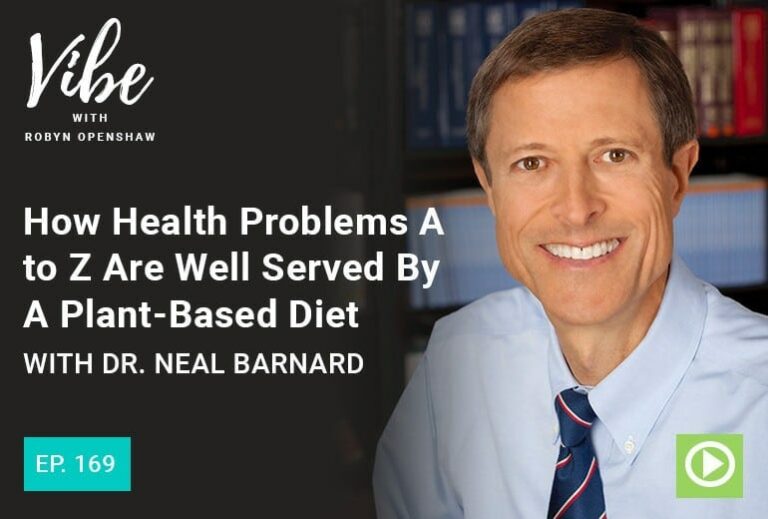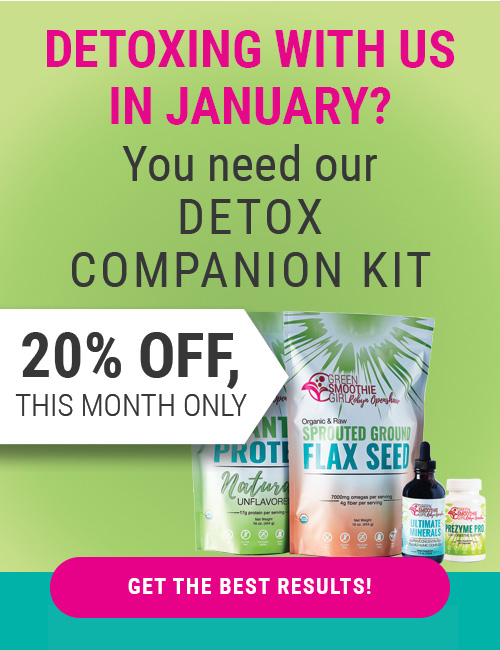Ep. 169: How Health Problems A to Z Are Well Served By A Plant-Based Diet with Dr. Neal Barnard | Vibe Podcast

Podcast: Play in new window
For years I’ve wanted to interview Physicians for Responsible Medicine founder Neal Barnard, M.D. He is delightful to talk to, and keeps the conversation positive about helping people eat a more whole-foods, plant-based diet. (He even talks about what his own personal daily diet looks like.)
LINKS AND RESOURCES:
Get the book “Your Body in Balance”
Connect with and learn more about Dr. Neal Barnard
EPISODE HIGHLIGHTS WITH DR. NEAL BARNARD:
- [03:23]: Plant-Based vs Vegan Diets. Dr. Barnard explains how terminology shifts.
- [09:31]: Your Guide to Estrogen. Dr. Barnard explains how these popular food products make your estrogen levels fluctuate.
- [11:38]: Soy and Flax. Dr. Barnard debunks popular myths about these two dietary ingredients.
- [13:41]: Medication. Dr. Barnard explains how a good diet can replace medication.
- [21:11]: Thyroid and You. Dr. Barnard explains the two highest reasons thyroid problems occur.
TRANSCRIPT:
This transcript has been edited for clarity. Robyn: Hey, everyone. It’s Robyn Openshaw and welcome back to the Vibe show. Today we finally get to talk to one of my all-time heroes. We had reached out and asked him to be on the show a few times before, but he finally made time for us, probably just because I’m a nag. Neal Barnard is a medical doctor. He’s also a professor of medicine at George Washington University School of Medicine from my hometown in Washington D.C. He’s the founder and the president of the Physicians Committee for Responsible Medicine. PCRM is an organization that you’ve probably heard of. He is very serious about advocating for preventative medicine, good nutrition, and higher ethical standards in research and in practicing medicine. He’s a big advocate based on his overview of the research for plant-based diets and has gotten them written into the dietary guidelines for Americans. Since 2015, he’s been a fellow of the American College of Cardiology. He’s the founder of the Barnard Medical Center in Washington D.C. They’re leading out on making nutrition a major part of all medical care. I had some tech issues that delayed our interview today by 30 minutes. This ended up being a short interview. [Do] you know the Parkinson Law — the job takes as long as you have for it. We got a lot done in this 30 minute interview. I think you’ll enjoy hearing from one of my all-time heroes, someone I’ve followed for literally decades now. Dr. Neal Barnard. Welcome to the Vibe show, Dr. Neal Barnard. Dr. Neal Barnard: Thank you, and great to be with you today. Robyn: We got a late start. I just have some important questions I want to ask you. You could have a big room full of a thousand nutritionists and health and wellness experts. I’m personally in one that has more than a thousand people of this variety. It’s their career to help people with their health. They might be a CNS or nutrition expert, and very few of them embrace the plant-based movement anymore or they say they’re plant-based, but they might eat up to 50% animal products. There seems to be this movement afoot that’s worse than anything I’ve seen in my 25-year career that’s a little bit hostile to vegans. Will you talk a little bit about the whole term plant-based? I feel like it’s gotten watered down. Even people doing the ketogenic diet sometimes will say that they’re plant-based. Where do you think that comes from? Dr. Neal Barnard: I wouldn’t worry about it too much. Terminology is something that drifts around. The word vegan is very clear. It means you don’t eat animal products at all. It means you don’t eat meat. You don’t eat dairy, you don’t eat eggs, you’re vegan. The word plant-based was invented to make vegan sound more normal. You don’t have to be a philosopher, or you don’t have to wear a tie-dyed shirt or have a taste for folk music to be plant-based. It sounds totally normal. The problem with plant-based is that, while it does sound more normal, it’s a little more vague. Some people might say, “I eat mostly plants, but not entirely plants.” That’s kind of a current situation, but I wouldn’t worry about it too much. The good news is that more and more people are getting the animal products off their plate. The more you do it, the better off you are. What we have found is that the benefits of doing that are becoming more well-known all the time. It started out with being a great way to lose weight. Dean Ornish showed you could reverse heart disease. Our research shows that you can improve and sometimes even eliminate diabetes with this approach. It’s way beyond that. We’re now talking about mundane things like menstrual cramps and endometriosis and infertility and so many things that are addressed by this diet. Getting the animals off your plate is just a great, great way to go. Robyn: I have a colleague who’s been on this show a few times. He and I have this running debate about whether the evidence shows that (and he believes) there’s a right diet for cardiac disease. There’s a right diet for diabetes. There’s a different right diet for cancer prevention. He even believes that there’s a different diet for cancer prevention than for cancer treatment. What do you have to say about that? Do you think that the right diet works for all of these issues that are facing Americans? Dr. Neal Barnard: There are certain things that are pretty hard and fast rules across the board. There are some cases where you’re going to want to make a particular tune up in a particular situation. The things that we know apply to everybody is that a healthy diet includes vegetables, fruits, whole grains, and the legume group (beans and peas and lentils). Vegetables, fruits, whole grains and legumes. Those all turn into wonderful foods. Italian cuisine might be spaghetti with tomato sauce. If it’s Asian cuisine, it might be a cucumber roll or miso soup. If it’s a Mexican tradition, it might be a corn tortilla wrapped around spinach or beans or something. There’s many ways to interpret it, but those are the four food groups that become our staples. You should supplement vitamin B12. There’s never any need for animal products at all. Added oils can be skipped as well. That’s pretty much it. There are some times where you might want to take extra care. If you have someone where thyroid problems are a particular issue, you might want to pay more attention to iodine. Maybe they’ve got too little iodine in their diet or they need too much. In that case, you’re going to want to look at sea vegetables, which are a great source of iodine. There are various other things that you can do to tune it up. A person might be getting no sunlight at all, so they might need to supplement vitamin D. The general rules apply that nobody needs meat. Everybody needs plant foods. Robyn: What’s your take on people with hormone related problems? Since you brought up the thyroid issue, how did you discover that diet has everything to do with our hormone problems? Dr. Neal Barnard: Accidentally. I was sitting at my desk, and the phone rang. It was the young woman who had terrible menstrual cramps. So much so, she had a business meeting the next day and she thought, “I’m not going to be able to get on a plane to go there. What do I do?” I suggested something to her that I don’t think any doctor ever suggested before. I said, “I’ll give you a couple days of painkillers to get you through the current episode, but why don’t we try to prevent this next month?” I suggested a diet that had no animal products and kept oils to a bare minimum. It cured her. She didn’t have menstrual pain anymore unless she would bring the greasy foods back into the diet. I then did a randomized clinical trial of this very approach in a larger group of women. We found that it works well. We started to discover that we could manipulate estrogen functions. That’s the reason that a woman has cramps. Maybe one in 10 women [are] off the scale. The reason the woman has these cramps (we believe) is she’s got too much estrogenic activity in her body. Estrogen is the female sex hormone that causes the uterine lining to thicken up every month. If it thickens up too much, you get too much cramping at the end of the month. The reason this is important is the very same unhealthy diet that leads to excessive cramping is also the diet that’s going to lead to the same hormonal problems that lead to breast cancer. If we can cure the more mundane problems that come from estrogen excess, we think we can also hopefully stave off the life-threatening possibilities. Robyn: Okay. How can you manipulate estrogen in the body with your diet? Do you think that some women are too low and some women are too high? I have a personal reason to ask that. I’m headed into my annual testing, and I feel like my arms have gotten softer. I’m post-menopausal, and for some reason my hard arms are feeling squishy. I have a feeling that my estrogen is off. What do you do with food to make sure that — whether you’re a person who tests or not- – has the optimal amount of estrogen? Dr. Neal Barnard: Okay. Estrogen varies. It’s a bit of a roller coaster, but many women in the reproductive years have way too much. That, over the long run as I mentioned, increases their risk of post-menopausal breast cancer. Estrogen is, is dangerous, so to speak. All hormones are like that. Estrogens, testosterone, thyroid, hormone, insulin. If you have too little, it’s not good. If you have too much, it can be very problematic and even fatal. Let’s say a woman has cramping or has endometriosis or she’s got PCOS or whatever. I would encourage a woman to, first of all, avoid animal products. Now, why would you want to do that? Dairy products come from a cow and they contain the estrogen from the cow’s body. People may not be aware of it, but most dairy cows are impregnated every year. Pregnant cows crank out estrogen that gets into the milk. If you’re consuming milk or cheese or yogurt, you’re consuming traces of estrogen from the cow. The second thing is that the fatty foods, animal fats, increase the amount of estrogen in your body for reasons we haven’t figured out. Getting away from dairy is good. Getting away from fat is good. The third thing is that fiber is helpful, and that’s plant roughage. Fiber is in beans and grains and vegetables and fruits. Fiber helps your body to eliminate excess estrogens. It does it because estrogens are secreted from the liver into the intestinal tract. If you have plenty of fiber there, it carries the estrogens away. If you don’t have fiber, the estrogens are reabsorbed back into the blood. The reason we use a completely vegan diet or plant-based diet is that it has no dairy in it. You’re not getting the cow’s estrogen. It has plenty of fiber to escort the estrogen away. It doesn’t have the fat in it that’s going to drive the estrogen stuff. In a nutshell, that’s how we’re going to calm down cramps and endometriosis and that kind of thing. Robyn: A lot of our audience tells us that they have issues with these things. What about soy? Assume it’s non-GMO. Assume it’s a more whole foods version of soy. What about soy? What about flax? There are so many controversies about that. A lot of women tell me that they think they shouldn’t be eating flax because they have estrogen issues. Dr. Neal Barnard: Let’s start with soy. Soy is fine. There is a lot of paranoia about soy, but it’s not based on science. It’s sort of the same people who believe the world is flat. I think that’s always a problem. The evidence is quite clear that soy, although it attaches to the estrogen receptor, it’s more of a break on it rather than stepping on the gas. Women who consume the most soy products have the least breast cancer risk. There have been many, many studies done. The evidence is pretty consistent that if you consume a fair amount of soy (I’m talking about soy milk or tofu or edamame, these kinds of things) your risk of breast cancer will drop by about 30% — roughly — compared to women who avoid soy. [Of] women who have had breast cancer in the past, those who consume the most soy have the least likelihood of dying of their cancer. Soy is a good thing. Robyn: Okay. Soy. What about flax? Dr. Neal Barnard: Flax? Probably much the same. The only issue here is, I think that you don’t necessarily need to dig into enormous quantities of these things because they’re fatty. I am inclined to think that flax is probably about the same. Robyn: What do you think about the way medications are being used? You can apply that to the subjects we’re talking about here. Breast cancer. Probably more hormone though. You’ve just talked about two of the issues that I get asked about the most by our audience. Dr. Neal Barnard: I’m sorry, which two are those? Robyn: Breast cancer and hormone issues. The big question is how are medications being used that is or isn’t appropriate in medicine the way you see it. Dr. Neal Barnard: Wonderful question. Thank you for that. Medications are way overused. Take a typical case. A person goes to the doctor and they’ve got a high cholesterol. They’re going to walk out of the clinic with a prescription for a statin drug like Lipitor or Mevacor or something like that. 90% of those cases, their cholesterol would come down decisively if they would just follow a completely plant-based diet (by that I mean a vegan diet) and if they kept the oils low. The benefit of that is not only do you spare the patient from whatever side effects and expense there is from the medication, but if you look at people with who are on statins over the long run, they tend to gain more weight, and their risk of diabetes goes up. Good heavens let’s do it with diet if we possibly can. There is a role for medication, but it’s much smaller than it is now. Take people with fertility treatments. How many couples are spending hundreds of thousands of dollars on fertility treatments when fertility can be influenced by diet. The milk sugar, galactose, breaks down in a woman’s body which appears to be toxic to the ovaries. Will getting away from that improve your fertility? Let’s give it a try. In the menstrual pain study I described earlier, one of the women in the study said that she was infertile. The second month that she was on the vegan diet, she became pregnant. She ended up having three children after that. I use this simply to illustrate the fact that when we get our bodies back in balance, we often don’t need not just medications but other kinds of medical treatments. There’s still a role for treatments, but they should be used much less frequently. Robyn: Yeah. My story is that I went through six years of infertility treatments, the drugs, and the roller coaster [of] procedures, and five artificial inseminations. Then I went whole foods plant-based. I didn’t just get rid of animal products. I also got rid of all the garbage food products. I had a four beautiful babies with no intervention. That made a believer of me. I’ve just gone deeper and deeper in my research of it. I know that you have a lot to say about the plant-based diet. You would go the distance, and you say vegan diet. I love it. Go for it. I’m interviewing those guys, Robbie and Cyrus. I don’t know if you know them. Dr. Neal Barnard: Yeah, sure. Robyn: I’m interviewing them today as well. [I am] excited to hear what they have to say because there’s way too little talk about the vegan diet with diabetes. Tell me your take on that. Dr. Neal Barnard: Again, don’t get too hung up on the words. Vegan just means you’re not eating animal products. That’s a good thing. There are some people who will say, “Yeah, but if you’re vegan you could still eat potato chips.” That’s true, but that doesn’t mean going vegan is bad. Vegan is always good. Getting away from animal products is a good choice. What you discover is that a vegan diet is not the extreme end of your dietary exploration. It’s the beginning of it. Once you get the animal products off your plate, you then start looking at overly processed foods or greasy foods or sugary junk. You can start thinking, “Wait a minute. Maybe I want to eat more simply.” You’ll find that there’s lots of ways of dealing with this, and I’m sure that that Robbie and Cyrus will talk about having whole foods and simpler foods. They’re right there. They’re making a good point. Robyn: I’m doing another episode reviewing Game Changers. There was a great three-man case study experiment in about erectile dysfunction. I actually pitched to my publisher several years ago about writing a book called the Amazing Sex Diet because my former career was as a sex therapist. Basically, the thesis of the book is if you suffer from erectile dysfunction, eat plants, cut out the animals and the oils — like you’re saying. What kind of evidence do you have? We definitely saw in Game Changers’ pretty fascinating experiment that got the giggles out of some NFL players. What’s the role of nutrition in treating erectile dysfunction? I think you’ve got 40, 30, 40% of men over 40 [that] sometimes or often have a sexual dysfunction. Dr. Neal Barnard: Oh yes. Well, first of all, if you see erectile dysfunction all the time, you see it cured all the time. With a plant-based diet, it happens all the time. It’s one of the more common side effects we see. Erectile dysfunction is not caused by performance anxiety. It’s caused by narrowed arteries. If a person grows up (as most men do) eating meat or dairy products or eggs, these foods have saturated fat in them. It causes your body to make more cholesterol. They also have cholesterol itself. As time goes on, the man’s arteries start to get narrower and narrower. The arteries to his private parts are the ones that are pretty narrow to begin with. If you don’t have good blood flow, he’s just not going to perform. The male sexual anatomy is this hydraulic system that needs blood flow to work. He doesn’t have it because his arteries are narrowed. Viagra will temporarily open them. Every doctor knows a man in his mid-fifties or thereabouts who has got erectile dysfunction. They know it’s not performance anxiety. They know it’s atherosclerosis. If they’re a good doctor, they’ll explain to him that Viagra isn’t going to treat your atherosclerosis. You have narrowed arteries in your heart, you have narrowed arteries. The carotid arteries to your brain are narrowing, and you could have a stroke. You have to change your diet to save your life. In the course of this, we very often see the erectile dysfunction going away too. Robyn: I’m so glad you said that because I’ve been saying this for a long time and saying that I wish that therapists would understand this. They are kind of barking up the wrong tree to help these couples with this issue that’s becoming an epidemic. Dr. Neal Barnard: Let’s go further. In Your Body and Balance, I have a whole chapter on erectile dysfunction. It gets more than that. Let’s say the man is at least able to perform sexually. Let’s say he wants to be a father. Studies have shown that the more cheese men eat, the lower their sperm counts. Why? Because you’re dosing yourself with estrogen with every bite of dairy products. [As] we were talking about earlier, the dairy has estrogen in it. As long as you’re consuming dairy, you’re consuming estrogen. That’s not good for a man’s reproductive fitness either. Robyn: Yeah. Let’s talk about thyroid. There’s a lot that circulates on the internet that people have bought into. Like if you have low thyroid Hashimoto’s, you should be avoiding some great classes of whole foods because of the anti-nutrients in them. I’ve dug pretty deep on this, and I can’t find the evidence that if we’re eating cruciferous or eating foods with goitrogens in them, that this is somehow bad for the thyroid. In fact, I can find a lot of different phyto-compounds in there that are useful to the thyroid. What’s your take on that? Do you think that there are classes of food that people should avoid with thyroid or just same as we’ve been talking about? Eat a whole foods plant-based diet. Dr. Neal Barnard: Okay. I think we should make sure that our listeners know what we’re talking about. Your thyroid gland is at the base of your neck, and it makes thyroid hormone. That thyroid hormone goes through the blood, all throughout your body. As it does, it gives you energy, and it regulates your body temperature. Think of it as your energy source. You could be hypo-thyroid (which means you don’t have enough thyroid hormone in your blood) or you can be hyperthyroid which is the opposite. You got too much. The number one reason worldwide that people are low in thyroid is because they’re low in iodine. They’re not getting iodine in their diet. Iodized salt came out in 1924, and it’s got all the iodine you’re ever going to need for most people. If you switch to sea salt or Himalayan salt, unless it specifically says it’s iodized, it probably is not. You might be missing that source. The best food source of iodine, apart from iodized salt, is sea vegetables. Go to a sushi bar. Skip the fish sushi, but have the vegetable sushi, cucumber roll, the sweet potato roll, that Nori seaweed wrap. All seaweeds have a lot of iodine in them. That’s going to take care of that. The bigger reason for thyroid problems is not iodine deficiency. Worldwide, that’s a big thing. In the United States, the bigger reason is an autoimmune reaction. Our bodies are reacting to something — possibly food — that is causing us to make antibodies to our thyroid gland. That can either cause the thyroid to act up and create too much thyroid hormone or you can cause it to shut down and make too little. When people look at large populations, the group with the highest prevalence of hypothyroidism is OVO lacto vegetarians, meaning people who are eating a lot of dairy cheese. Vegans have the least risk. If you look at hyperthyroidism again, the vegans do the best. The omnivores do the worst. What we think is happening is somehow the meat [and] the dairy products are triggering the production of thyroid antibodies. Robyn: Okay. Last category of health and wellness problems and what diet has to do with it. With our last few minutes talk about your body of work and a couple of things in your background. I would normally [talk about this] at the beginning. You and I got a late start. Talk a little bit about depression and anxiety. Probably one of the top three things that people talk to me about. What role do you feel that the evidence shows nutrition plays in depression and anxiety? Dr. Neal Barnard: I think we’re still learning, but we’ve stumbled into this area because years ago we did a study at Geico, the car insurance company. The reason we did this is their office is about four blocks from my office. We instituted a vegan diet at work for Geico employees. That meant that they could eat vegan foods in the cafeteria and they could have a weekly class or support group to help them stick with it. What we found is that not only did they lose weight and their diabetes got better (which was the purpose of the study), but their moods noticeably improved. Their anxiety diminished and their depression would resolve as well. In fact, their job absenteeism got better. We started looking at other research studies, and we found that there’s a body of literature suggesting that depression does get better with plant-based diet. I do think we need more research here just to see how universally that’s true. We do have two hypotheses as to why this is. The first thing is it’s an anti-inflammatory diet and depression seems to be — at least in part — driven by inflammation in the brain. The second thing is that a plant-based diet gets your gut microbiome back in balance. If your gut microbiome is out of balance, then all kinds of problems can result, including mood changes. Those are what we believe are probably the mechanisms. Robyn: Everybody loves the answer to this question. What do you eat? What are some of your favorite foods? What does your daily menu look like? Dr. Neal Barnard: My favorite foods depends. I grew up in North Dakota where it was every day roast beef, baked potatoes and corn, except for special occasions when it was roast beef, baked potatoes and peas. Very limited diet. Nowadays, I live in Washington D.C. Typical lunch for me might be more Mexican influence, like a bean burrito with jalapenos and a spicy tomato sauce or something like that. I’m a big fan of Japanese food. Of course, I would do it all plant-based, so I might have a cucumber roll or sweet potato roll and miso soup. Seaweed salads and that kind of thing are great. Of course, you can’t be without Italian. If I had an Italian dinner, it would be angel hair pasta with some maybe roasted garlic and artichoke hearts and tomato sauce. Grilled mushrooms added with maybe some asparagus on the side. Those are a few things. My diet now, despite the fact that it’s vegan, is much more interesting and tastier than the old meaty diet that I grew up on. Robyn: I totally agree. That’s what I used to make every Sunday night was a roast and potatoes and a little bit of vegetables on the side. I thought I was being a great mom by putting a little bit of vegetables on the side, which were, of course, cooked. How far we’ve come. Tell us about your body of work, your latest book which you’re working on that you’re excited about. Dr. Neal Barnard: Yeah. This new book is called Your Body in Balance. The reason I call it Your Body in Balance is that you need a little bit of hormones, but you don’t want too much. You need to have them in balance. The book starts off talking about sex hormones. We’ll talk about fertility and menstrual cramps and PCOS and endometriosis. Then we’ll talk about hot flashes and how foods can play a role in all of those things. That’s where the erectile dysfunction discussion is. Also cancer for men, cancer for women. These are all related to hormones. We’ll switch gears. We’ll talk about metabolic issues, thyroid hormone, and diabetes. I have a chapter at the end about how to avoid the environmental chemicals that might be causing part of the problem too. I want to brag about the recipes. They were done by Lindsay S. Nixon. She’s the Happy Herbivore. Lindsay Nixon gave me 65 bang up, great recipes that are easy to make. She sent them with a note saying that this very same diet change had helped her to cure her own menstrual cramps. I took that as a validation. Robyn: That’s wonderful. Your Body in Balance, everyone, anywhere books are sold. Where can my followers find you on social media or get on your newsletter list, whatever you’ve got going on. Dr. Neal Barnard: Okay, well our website is PCRM.org. That stands for Physicians Committee for Responsible Medicine. You’ll see PCRM all over social media. You’ll see me, Neal Barnard, all over social media too. I hope you’ll join us and we’ll be good friends. Robyn: Oh my gosh. Thank you so much. We crammed that in there at the end. It’ll be a short interview, but I just feel so very great. Dr. Neal Barnard: Well, it’s been fun doing it. Why don’t we do it again someday?Plant-Based Diets vs Vegan Diets vs Ketogenic Diets
Plant-Based Diets for Menstrual Pain
Plant-Based Diets for Estrogen Levels
Plant-Based Diets vs Medication
Plant-Based Diets and Erectile Dysfunction
Plant-Based Diets for Thyroid Problems
A Plant-Based Diet in the Works
[Related Vibe Podcast Episode: Ep 168: Everything You Think You Know About Diabetes is Wrong! with Robby Barbaro and Cyrus Khambatta]














No comments found, but you can be our first!